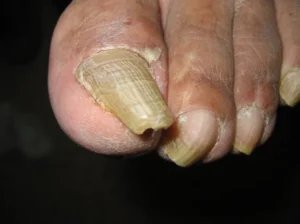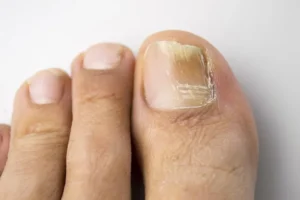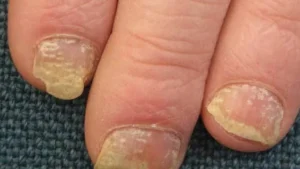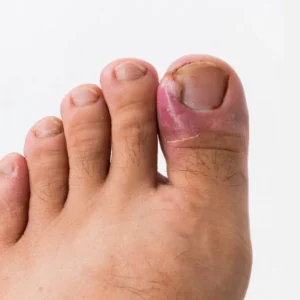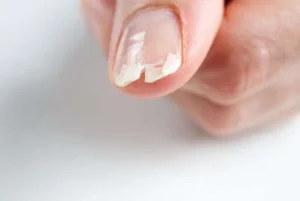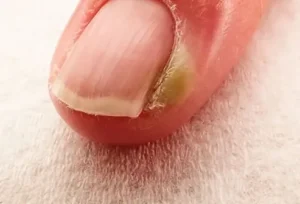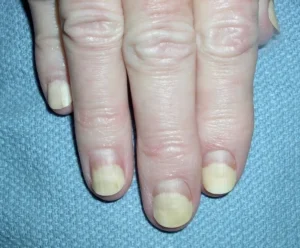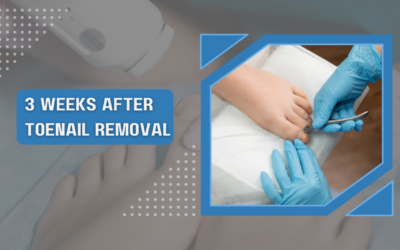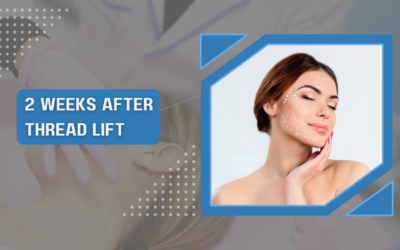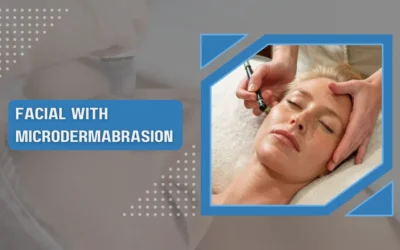Nail Disease Treatment in Faridabad
Nail diseases are relatively common as nails are constantly exposed, abused, and least taken care of. Poor hygiene, genetics, improper diet, tight footwear, and underlying health issues can affect your nails’ appearance, strength, and health.
It is advisable to seek treatment for nail diseases at the earliest as nails reveal a lot about your health, and the dermatologist can identify the underlying cause of your problem.
If you notice any abnormality in your nails, you can consult Dr. Archit Aggarwal for the best nail disease treatment in Faridabad. He is a well-known dermatologist in Faridabad and the founder of KDC Clinic, Faridabad. Our state-of-the-art facility is fitted with top-of-the-line technology and medical equipment to provide excellent care and outstanding results.
Read on to know different types of nail disorders, their causes and symptoms, and options for nail disease treatment in Faridabad.
Overview
Nail disease or disorder can occur at any age, and it is mostly caused by a virus, bacterial, or fungal infections, genetics, and underlying conditions. People at high risk of having nail disorders are those who have diabetes, or cancer, are undergoing dialysis, or are transplant recipients.
Dr. Archit Aggarwal treats thousands of patients with nail diseases every year. He diagnoses the issue with evaluation, diagnostic imaging, dermatoscopy, histopathological examination, and mycological testing.
According to the findings, he plans an appropriate nail disease treatment in Faridabad that is effective, long-lasting, and affordable.
CONTACT US FOR MORE INFORMATION OR BOOK AN APPOINTMENT
Common Nail Diseases, their Causes and Symptoms
1. Onychogryphosis
Onychogryphosis is a nail condition wherein the nails grow thicker with a curvature. It usually affects the big toe but can occur on all the nails.
Symptoms
- There are ridges and grooves
- Turn brownish
- There is more growth on one side
Causes
- Psoriasis
- Injury
- Genetics
- Circulation issues
- Ichthyosis
Treatment
- The dermatologist will cut the nail and let it regrow. He will show you how it has to be done at home in the future.
- However, the most likely and permanent treatment for onychogryphosis is surgically removing the nail bed.
2. Nail Fungal Infection
Nail fungal infection makes the nail discolored, thick, and brittle. It is a common condition that mainly affects the toenails than fingernails.
Symptoms
- Nails turn yellow, brown, or white
- Increase in thickness
- Fragile
Causes
- This condition occurs when fungi become trapped between the nail bed and nail due to a crack in it. Many types of fungus and molds can cause this condition. Other potential risks are athlete’s foot, sweat, and salon manicures.
Treatment
- Dr. Archit Aggarwal treats nail fungal infections with antifungal medications. He may also recommend removing the affected nail. It can take up to one year to treat it successfully.
3. Nail Psoriasis
The nail plate loses cells in nail psoriasis. This leads to small pits on the nails that look as if it is hit by a pen tip.
Symptoms
- Pitting
- Skin build-up under the nails
- Crumbling nails
- Nails turn brown or yellow
- Nails get separated from the nail bed
Causes
- It usually happens to people having psoriasis. It affects the nail bed or the area around it.
Treatment
- Laser treatment
- Corticosteroid cream
- Corticosteroid injections
- Calcipotriol for treating skin build-up under the nail
- Tazarotene for treating discoloration and denting
4. Ingrown Nails
Ingrown nail is a common occurrence in which the corner of the toenail grows into the flesh on the sides. It causes swelling, pain, inflammation, and infection in some cases.
Symptoms
- Soreness
- Pus
- Redness
- Swelling
Causes
- Physical injury
- Genetics
- Not trimming the nails
- Wearing tight shoes and socks
Treatment
-
The treatment for ingrown nails is surgery and taking medications for the pain.
-
Furthermore, you should soak the foot in warm water 3-4 times a day and wipe it dry. Wear comfortable shoes.
5. Brittle Splitting Nails
Onychoschizia, or brittle splitting nails, is a condition that makes the nails soft, thin, brittle, and splitting. Women suffer from it more often than men.
Symptoms
- The obvious symptom is nails breaking easily. Rarely there is an underlying issue or vitamin deficiencies.
Causes
- Age
- Low thyroid levels
- Anemia
- Cancer treatment
- Nutrient deficiency
Treatment
- The most effective remedy is to keep your nails moisturized and protect them from harsh chemicals and repeated water exposure. It also helps to keep your nails short and eat more proteins.
6. Paronychia
Paronychia is an infection that occurs around the edges of the nail. If not treated, it will become more severe and affect the entire toe or finger.
Symptoms
I. For acute paronychia:
- Redness
- Swelling
- Pain
- Yellow pus
- Fever in severe cases
II. For chronic paronychia:
- Pain
- Redness
- Tenderness
- Inflammation
- Green or yellow pus
Causes
- Acute paronychia develops when there is trauma to the nail fold or cuticles. Chronic paronychia happens due to irritants or allergens.
Treatment
Dr. Archit Aggarwal provides nail disease treatment in Faridabad according to the severity and underlying cause of the problem. He will treat acute paronychia with:
- Corticosteroids
- Topical antibiotics
- Oral antibiotics
- Incision and drainage
As for chronic paronychia, he will manage the condition by treating the root cause of the inflammation. The treatment can go on for several weeks or months.
7. Onycholysis
In onycholysis, the nail separates painlessly from the nail bed. It happens slowly over a period due to injury or underlying medical conditions.
Symptoms
- The nail turning yellow, green, purple, or opaque
- Nail pitting
- Bending of the edges
- Nail thickening
Causes
- Chemical exposure
- Excessive filing
- Excess submersion in water
- Allergic contact dermatitis
- Fungal infection
- Psoriasis
Treatment
- Oral antifungal treatment
- Treating psoriasis
- Treating iron deficiency
Why choose KDC Clinic for nail disease treatment in Faridabad?
- Dr. Archit Aggarwal is a highly experienced and skilled dermatologist having extensive knowledge about nail diseases.
- He keeps himself abreast with the latest advancement in dermatology and cosmetology so that his patients can benefit from the newer advanced procedures and therapies.
- He is known to provide the best nail disease treatment in Faridabad. He excels in all the latest medical treatments, including lasers, surgical intervention, electrical currents, etc., to treat nail disorders.
Nail Health Solutions Tailored for You
Explore customized dermatological care crafted to meet the distinct needs of each individual, guaranteeing optimal nail health for every member of your family.
Nail Health Expertise
Holistic Hair and Skin Care
Aesthetic Solutions
Nail Disease Treatment Excellence
Uncover the pinnacle of nail care through our extensive dermatology services. Whether it’s diagnosis or treatment, we are your ultimate destination for promoting healthy and vibrant nails.
Frequently Asked Questions
Can we prevent nail diseases?
It is advisable to keep your nails clean and trimmed. You should refrain from using harsh detergents and chemicals. And as many nail diseases are due to underlying medical issues, you should go for a regular check-up and live a healthy life.
Can everyone undergo nail treatment?
Many medications given by the doctor are prescription drugs that may have some side effects. So, it is necessary to inform the doctor if you have liver disease, diabetes, kidney disease, autoimmune disorder, AIDS, HIV, etc.
How does laser treatment help treat nail diseases?
A high dose of laser light helps eliminate stubborn fungus, which was not possible with other treatments.
CONTACT US FOR MORE INFORMATION OR BOOK AN APPOINTMENT
Dr. Archit Agarwal's Dermatology Success Stories
CONTACT US FOR MORE INFORMATION OR BOOK AN APPOINTMENT
Recent Posts
3 Weeks After Toenail Removal
Are you wondering how your toe should look and feel 3 weeks after toenail removal? By now, your...
2 Weeks After Thread Lift
Wondering what your skin looks like 2 weeks after a thread lift? By now, the healing process is...
Facial with Microdermabrasion: A Revitalizing Skin Treatment
Our appearance plays a significant role in how we feel about ourselves. As we age, our skin...

